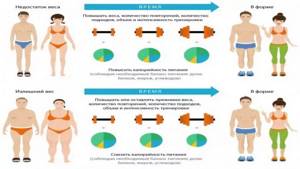weight gain as simply an unpleasant phenomenon, but it is most often the result of overeating and a sedentary lifestyle. Weight gain can lead to obesity, and it affects more and more people around the world in industrialized countries. And being overweight, for example, can have a negative impact on the cardiovascular system.
Description
How many calories does a person need?
Food provides the body with energy, which is measured in kilojoules (kJ) or kilocalories (kcal). How much energy a person needs every day depends on their lifestyle and other factors such as the amount of exercise, age or even gender. Men typically have slightly more muscle mass and should have a calorie intake of between 2,400 and 3,100 calories per day. Women should consume between 1,900 and 2,400 calories per day. During strenuous physical activity, such as competitive sports or strenuous physical work, your daily basal metabolic rate can increase many times over.
If a person consumes more calories than the body needs, then over time this increased calorie intake will lead to weight gain. For some people, weight gain is not due to eating habits or lifestyle, but may be due to various reasons: the use of certain medications, various diseases or hormonal changes during menopause. In these cases, weight gain is not uncommon.
However, weight gain is not necessarily associated with fat accumulation. Diseases that cause water retention (edema) also increase weight. Weight control is used for heart conditions that cause swelling in the legs. You should weigh yourself daily to monitor water loss with medications (eg, diuretics).
Building muscle mass through exercise also leads to weight gain. This is frustrating, especially in the diet that many sports require, because many people don't know that weight gain comes from newly built muscle.
Weight gain is also normal during pregnancy or growth . In old age or in women after menopause, the waist circumference may increase. As you get older, your metabolic processes slow down. In addition, activity often decreases over the years, and the lifestyle becomes more relaxed, which inevitably leads to extra pounds.

Causes and possible diseases
Physical reasons
Hypothyroidism: Deficiency of the thyroid hormones triiodothyronine and thyroxine affects the body and even the intellect. These hormones slow down your metabolism. The consequence of this is weight gain, despite loss of appetite, difficulty concentrating, fatigue, depressed mood and dry skin. Bradycardia also occurs. Women experience cycle fluctuations.
Cushing's syndrome: The adrenal cortex produces steroid hormones, including cortisol. The release of these hormones is controlled through the pituitary gland. If this control is disrupted by pituitary tumors or diseases of the adrenal cortex, the amount of steroid hormones increases - Cushing's syndrome develops. Typical symptoms include an obese torso, moon-shaped face, thin arms and legs, decreased muscle mass, and increased blood pressure.
Hormone- producing : Both malignant and benign tumors that are located in the area of the hormone-producing glands affect the release of hormones. This can lead to overproduction of hormones or poor functioning of the glands. Depending on the gland, the effect on the body is different. Examples of such tumors:
- Pituitary tumors,
- Adrenal tumors
- Tumors of the thyroid gland.
Edema. Diseases of certain organs cause water retention in tissues, which also leads to weight gain. This is apparently associated with swelling of the legs, swollen face and eyelids, or even ascites. The reasons are very different:
- Heart disease: primarily heart failure.
- Liver diseases : cirrhosis often manifests as ascites.
- Kidney diseases : renal failure, nephritis (glomerulonephritis).
- Allergies.
- Lymphedema and lymphatic drainage disorders.
Mental causes
Mental stress can be extremely harmful to your eating habits and cause weight gain.
Food addiction. Along with anorexia nervosa and a tendency to overeat (bulimia), food addiction is also an eating disorder. Compulsion to eat over time leads to weight gain, overweight or even obesity.
Excessive consumption : Not only does poor diet cause weight gain, but drinking too much alcohol over the course of a year will make you fat. Especially in women, alcohol deposits fat on the ribs and increases waist circumference.
Stress: When stressed and lovesick, people's tendencies can be completely different: while some refuse to eat and suffer from loss of appetite, others suffer from food cravings and hence weight gain.
Depression: Many people suffer from depression. In addition to lethargy, sadness and suicidal thoughts, depression has a profound effect on appetite. For some, this disease leads to loss of appetite, for others, internal emptiness and sadness are filled with food, which results in weight gain.
Drugs
There are some medications that affect weight.
Cortisone: Using high doses of cortisone over a long period of time eventually leads to symptoms such as Cushing's syndrome. Water retention on the face and torso increases weight with a typical fat distribution.
Antidepressants: A side effect of some antidepressants is weight gain. This affects the quality of therapy, since patients may enter a new depressive phase due to extra pounds.
Insulin. A common side effect of insulin therapy, in which insulin is given on a fixed schedule, is weight gain. Additionally, although rare, water retention is possible.
Hormonal contraceptives (eg pills). Many women suffer from water retention when taking hormonal contraceptives. But it is also common for women to experience an increase in fat when taking them.
Why is there a plus on the scales in the morning?
Didn’t you eat anything extra or harmful, didn’t miss a workout and gained weight? This happens, no need to panic. There may be several reasons why weight increases.
The first is that you ate salty foods the night before. It retains water in the tissues, which leads to swelling. So, by consuming only 10 grams of salt—about the amount contained in 100 grams of salted fish—you can add a whole kilogram. Therefore, you should be careful with pickles. In the morning, swelling is guaranteed if in the evening you eat salted or smoked fish, canned cucumbers, tomatoes, or any dish that is over-salted or generously flavored with soy sauce. Although the latter is classified as a conditionally “correct” product, it is very salty and can greatly retain water.

The second reason is the end of the cycle. Before “these days,” a woman’s weight increases on average by 1.5–2 kilograms. This happens because before the CD the body tries to make as many reserves as possible, including water. There is absolutely no need to worry about this - it is not fat, but liquid. The weight returns to normal in 4–5 days.
The third reason is the lack of water every day. This means that you systematically do not finish your norm ( 30 ml for each kg of weight ). In this case, the body again has no choice but to store. When a person does not drink enough water, the body stores it to maintain hydration.
The fourth reason is training. Physical activity promotes muscle growth, and muscle is denser and much heavier than fat. After exercise, the muscles swell slightly, which can also lead to weight gain.

If you not only adhere to proper nutrition, but also engage in strength training, remember: the weight will not begin to fall rapidly, but the quality of your body will greatly increase. With regular exercise, sagging skin and muscles will go away, body contours will tighten and take on more seductive shapes.
Finally, there is another explanation - you are not weighing yourself correctly. This should be done in the morning, in the same clothes or without them, after visiting the toilet, on an empty stomach. If you weigh yourself today without underwear, and the next day in a warm robe, the scales will show more. Everything about how to weigh yourself is in this article.
In addition, many people step on the scale every day. Some even twice a day. There is no need to do this. To track your results - your progress or regression, it is enough to weigh yourself 1-2 times a week. It is also advisable to take measurements. They often give a more accurate idea of whether a person is losing weight or not.
News Media2
When should you see a doctor?
Many people eat the same amount as before, or less than before, but still gain weight. Poor diet and lack of exercise are often to blame. Age may also play a role. In women, hormonal fluctuations are often the cause of weight gain.
Doctors say that weight gain is associated with a disease in which the waist circumference continues to grow, despite proper nutrition, and the reasons for this are not obvious. In this case, you should consult a doctor.
If diet isn't working, a physical exam can help clarify stagnant weight. For example, if hypothyroidism is behind it, any attempt to lose weight will be difficult, but the disease is highly treatable. Water retention in tissues is always the reason for a visit to the doctor.
Visit your doctor if you experience:
- Constant weight gain for no apparent reason.
- Weight gain despite loss of appetite.
- Swelling, thick legs, fat belly.
- Additional complaints such as shortness of breath or lethargy combined with loss of appetite.
How the body stores fat
Metabolic slowdown
The further you go from your set point amount of fat, the more the body prevents further fat loss, causing your energy system Biology's response to dieting: the impetus for weight regain. work as efficiently as possible. Mitochondria, the cells' energy sources, begin to produce more energy from less fuel.
At the same time, your metabolism slows down, the amount of energy you expend on normal activities decreases, and even the thermic effect decreases. Effect of circadian variation in energy expenditure, within-subject variation and weight reduction on thermic effect of food. food - the number of calories you spend to digest food.
And the more fat you lose, the more efficient your body becomes. Moreover, the more often you expose your body to such a test, the better it learns to conserve energy. That is, on your fourth attempt to lose weight on a low-calorie diet, fat will go away much more slowly than in the first three.
Hunger hormones
When you lose weight, your fat cells shrink in size, triggering the secretion of leptin, a hormone that makes you feel full.
Study of Leptin signaling, adiposity, and energy balance. showed that during a calorie deficit, the fall in plasma leptin levels exceeds the rate of decline in fat stores. Moreover, this level remains low for some time after the weight has stabilized. This means that even after finishing the diet, you will find it difficult to get enough.
At the same time, a calorie deficit causes increased levels of ghrelin, the hormone responsible for the feeling of hunger. Thus, you constantly feel hungry, meals do not bring satiety, while your body conserves energy - ideal conditions for weight gain.
And when you stop dieting, you not only return to your old weight, but you also gain even more.
What does the doctor do?
During a personal interview with the patient (history taking), the doctor first learns about your health status. The following points are clarified:
- Since when have you been overweight?
- How many kilograms have you gained?
- In addition to weight gain, are there other symptoms such as fatigue, depression, lethargy, or shortness of breath?
- Have your eating habits or your activity level changed?
- Do you suffer from other diseases that cause weight gain?
- Are you taking medications that could explain your weight gain?
- Have you just gained weight or do you often suffer from thick legs or swelling?
During the follow-up physical examination, important key data such as weight and height are first determined. From this, body mass index (BMI) can be determined by dividing body weight by the square of height in meters (kg/m2). It shows whether you are overweight or even obese. BMI values between 18.5 and 25 indicate normal weight.
During the physical examination, the doctor will also determine if there is swelling in the legs or abdomen, which may be causing weight gain. Blood samples are analyzed in the laboratory for various parameters. Important readings include blood sugar levels, blood lipid levels, thyroid hormones, and levels that indicate changes in the kidneys or liver.
Using ultrasound (ultrasound), the condition of internal organs such as the liver, pancreas and digestive organs can be determined. Also, even the smallest accumulations of water (about 100 milliliters) in the abdomen are visible, which can lead to hidden weight gain.
Cardiac function is also assessed using an electrocardiogram (ECG).
Hormone levels and imaging techniques can help determine pituitary or adrenal pathology. Computed tomography (CT) or magnetic resonance imaging (MRI) can rule out or confirm hormone-producing tumors.
Sometimes doctors from multiple specialties must work together to uncover the causes of weight gain. These include hormonal specialists (endocrinologist), gastrointestinal specialists (gastroenterologists) and nutritionists.










